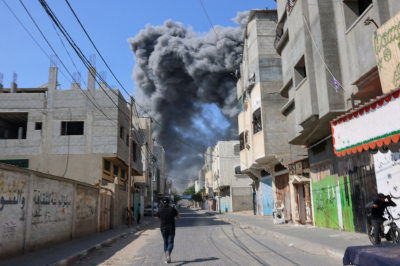The ‘Gordean Knot’ of moral proportionality in the Middle East (part 2)

Last week, I began the process of applying “Just War” Theory to the current Hamas mega atrocities against the Israeli civilian population and how just war criteria should be applied.
Remember, Just War Theory was never intended to “justify” war. Instead, it tries to bring war under the sway of justice as understood by Christians and to ensure that war, when it does occur, is hedged about by limits that mitigate its barbarity.
In fact, if all parties accepted just war criteria, there would be no war, since the theory’s first rule clearly states no war is just unless it is a last-resort defense against aggression. If everyone adhered to just war criteria, aggression would be eliminated.
Let’s remind ourselves briefly of Just War Theory’s criteria:
1. Just cause. War is only permissible to resist aggression and to defend those victimized by it. Only defensive war is defensible.
2. Just intent. The only acceptable motive must be to secure justice for all involved. Revenge, conquest, and economic benefit are insufficient, illegitimate and unacceptable motives. The restoration of the status quo ante is NOT sufficient.
3. Last resort. Resort to arms can only be morally legitimate when all other reasonable avenues of conflict resolution have been rebuffed or have demonstrably failed.
4. Legitimate authority. The use of military force is only the prerogative of governments. Consequently, only the duly constituted civil authority can legitimize military action.
5. Limited goals. If the purpose is peace, annihilation of the enemy or total destruction of his civilization is not acceptable. “Total War” is beyond the pale. Also, unless one’s survival or liberty is imperiled, it is not acceptable to resort to war unless the goals are achievable.
6. Proportionality. Will the human cost of the armed conflict to both sides be proportionate to the stated objectives and goals? Does the good gained by resorting to armed conflict justify the cost of lives lost and bodies maimed?
7. Noncombatant immunity. No war can be just which does not disqualify noncombatants as legitimate military targets and which does not seek to minimize collateral, inadvertent civilian casualties. No one has the right to make war on civilians.
Applying these criteria to the Israeli response to the Hamas tenant attacks will lead us to quickly focus on the salient points in dispute.
Clearly, the Israeli response is defensive. It is being authorized by legitimate authority. It is also a last resort and the declared intent is to secure justice and they are doing their best to recognize noncombatant immunity, even though Hamas is deliberately using noncombatants as a shield against Israeli attack.
The really thorny questions revolve around “proportionality.” When does the human cost of the military objective to be gained become so disproportionate that it morally outweighs the military gain?
As the definition of social justice rises, so does the acceptable price of noncombatant casualties. In the example I employed last week (the Hanoi oil tank storage facilities into which the North Vietnamese government moved civilians in to prevent American attacks), the moral responsibility for civilian casualties obviously rested with the North Vietnamese government. However, at what point would the civilian casualties override the military gains from destroying the oil storage facilities?
I would argue that the moral threshold for not attacking would be reached more quickly in inverse proportion to the goals sought by military intervention. In the case of the U.S., our goal was to prevent the Communists from subjugating South Vietnam, not seeking the liberation and democratic self-determination of the entire Vietnamese population. Consequently, the lower the goal sought, the lower the threshold at which the civilian casualties would outweigh the gain sought.
Just so, what Israel’s goals are are determinative in assessing proportionality. If their goal is to destroy the terrorist organization that is Hamas and to replace them with a government committed to human justice for Arabs and Jews (and keeping Hamas from poisoning the hearts and minds of another generation of Palestinian children), perhaps the higher noncombatant civilian costs are more acceptable than if they have much more limited goals.
Israel should have as its goal a just, civilized government for Gaza, aiming toward one run by civilized Palestinians. In the interim, it may need to be under U.N. trusteeship after Israel has rooted out the Hamas barbarians. The goal must be delivering the next generation of Palestinians, as well as Israelis, from the current barbarization fomented by Hamas and their Iranian puppet masters.
So, how far can and should Israel go? It depends on how noble their goals are. The more noble their goal, the higher the threshold for costs. If the goals are small and limited, the costs may be smaller now, but the costs will be exponentially higher the next time, and there will be a next time.
These are sobering days that try men’s souls. May God give us wisdom and courage.
Dr. Richard Land, BA (Princeton, magna cum laude); D.Phil. (Oxford); Th.M (New Orleans Seminary). Dr. Land served as President of Southern Evangelical Seminary from July 2013 until July 2021. Upon his retirement, he was honored as President Emeritus and he continues to serve as an Adjunct Professor of Theology & Ethics. Dr. Land previously served as President of the Southern Baptist Convention's Ethics & Religious Liberty Commission (1988-2013) where he was also honored as President Emeritus upon his retirement. Dr. Land has also served as an Executive Editor and columnist for The Christian Post since 2011.
Dr. Land explores many timely and critical topics in his daily radio feature, “Bringing Every Thought Captive,” and in his weekly column for CP.





















